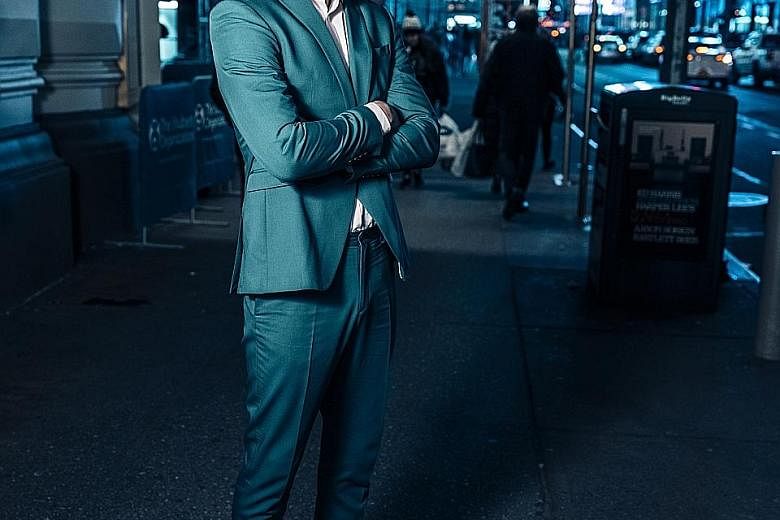NEW YORK • Russell Harvard has been waiting not so patiently for this his entire career. And now, at long last, for a deaf actor channelled inexorably into deaf roles, the moment has arrived: Playing a hearing character.
Harvard is part of the (mostly) new cast of Broadway's hit production of To Kill A Mockingbird, with actor Ed Harris following Jeff Daniels as Atticus Finch and actress LisaGay Hamilton succeeding LaTanya Richardson as the housekeeper Calpurnia.
Harvard assumes two supporting parts: Boo Radley, the mysterious, rarely seen neighbour of the intimidated youngsters, Scout and Jem Finch and, more prominently, Link Deas, the inscrutable local dismissed as a drunk.
And here is the thing that blew away Harvard, recently seen here as a demonstrably deaf Cornwall in actress Glenda Jackson's King Lear: Neither producer Scott Rudin nor director Bartlett Sher wanted him to play Link or Boo as deaf.
"For the first time, ever," the actor says during a conversation at Sardi's, the storied theatre district restaurant, across from the Shubert Theatre, where playwright Aaron Sorkin's stage version of the Harper Lee novel has been playing for a year. Harvard says Sher had to explain what he wanted three times before he could fully grasp it.
"Not about being hearing, not about being deaf," Harvard recalls Sher telling him. "I said, 'Okay, is there an interpreter in the courtroom scene, when they're asking me questions?' "
Nope, there would be no fixed intermediary between Harvard and the audience: He was to play a character who simply signs to communicate. The idea would be reinforced by the play's narrators, the actors playing Scout (Nina Grollman), Jem (Nick Robinson) and their friend Dill (Taylor Trensch), who would recite the lines that Link silently signs.
A few other times, though, Harvard - who has some residual hearing and strong vocal skills - would speak his own lines as he signed. But there would be no instance in which someone had to interpret for his character. As Harvard put it succinctly about Link: "I hear."
The implication of this decision for actors with disabilities is huge - commensurate in its way with the casting of actress Ali Stroker, who uses a wheelchair, as Ado Annie in the current revival of Oklahoma!, for which she won a Tony earlier this year.
Although Sher worked some years ago in Seattle with another deaf actor, Howie Seago, who, under similar arrangements, played the title role in a Greek drama, this innovation is revolutionary on Broadway.
"Hopefully," Sher says, "it becomes an option for people to consider deaf actors for roles they wouldn't normally be considered for."
Asked about Harvard's casting, Sorkin said in an e-mail: "I was worried that it wouldn't work. A hearing-impaired character showing up at the top of the second act and Scout, Jem and Dill being able to interpret ASL seemed like a logic puzzle the audience would be distracted by.
"But Bart and Scott were passionate about the casting and their passion almost always leads to good things, so I signed off on Russell. My worries turned to elation at his first table read. He's a phenomenal actor and we simply become invested in the character."
For Harvard, it is a personal breakthrough. The Texas-born actor, who grew up in a deaf family, won the vital role of the deaf son in the Oscar-winning film There Will Be Blood (2007) a decade ago. A few years later, he earned plaudits as a young man demanding that his hearing parents learn American Sign Language in off-Broadway's Tribes.
Now 38, Harvard says job offers do not exactly come rolling in, although he recently had a part in a movie, as yet untitled, starring actress Jennifer Lawrence. They had a scene together and he taught her some sign language.
"What a quick learner," he says.
Harvard also played all of the adult male supporting roles in Deaf West Theatre's Broadway revival of Spring Awakening in 2015, but deaf actors even of his calibre still struggle mightily for acceptance.
"My last audition was probably June, July," he says.
An interpreter, Mickie Raine, who has been with him all through Mockingbird, sits with him during the interview at Sardi's, but Harvard answers in his own voice.
"So I need people like Scott," he adds.
Rudin produced There Will Be Blood, as well as King Lear and Mockingbird. Over the course of a career like Harvard's, playing a hearing person should be a welcome challenge. An actor's livelihood, after all, depends on the ability to become someone else.
Here, in the case of Link especially - Boo is practically a silent role - Harvard has to be convincingly of a specific place and time, a country town in the Alabama of 1934. This presents particular obstacles to a deaf actor, even one who, with the help of hearing aids, has some ability to process sound.
For instance - a Southern accent.
"With my right ear, with hearing aids, I can tell a drawl," Harvard says. "I learnt through a dialect coach to find one word to hit the dialect, and then you're fine."
Normally when he is onstage, Harvard turns off his hearing aids, because it is a deaf world he is usually illuminating.
For Mockingbird, he says, they stay on. It makes sense, because the characters Link and Boo can hear. And, as Harvard explains, he also leaves them in because he wants "to be in charge... in full control."
What does that feel like, for an actor who wants to believe in unlimited possibility, in a field opening ever more widely to him, in which he might even play a hearing Hamlet?
"Liberating."
WASHINGTON POST

